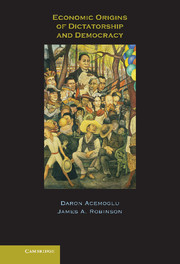Book contents
- Frontmatter
- Contents
- Preface
- PART ONE QUESTIONS AND ANSWERS
- PART TWO MODELING POLITICS
- PART THREE THE CREATION AND CONSOLIDATION OF DEMOCRACY
- 6 Democratization
- 7 Coups and Consolidation
- PART FOUR PUTTING THE MODELS TO WORK
- PART FIVE CONCLUSIONS AND THE FUTURE OF DEMOCRACY
- PART SIX APPENDIX
- Bibliography
- Index
6 - Democratization
Published online by Cambridge University Press: 05 September 2012
- Frontmatter
- Contents
- Preface
- PART ONE QUESTIONS AND ANSWERS
- PART TWO MODELING POLITICS
- PART THREE THE CREATION AND CONSOLIDATION OF DEMOCRACY
- 6 Democratization
- 7 Coups and Consolidation
- PART FOUR PUTTING THE MODELS TO WORK
- PART FIVE CONCLUSIONS AND THE FUTURE OF DEMOCRACY
- PART SIX APPENDIX
- Bibliography
- Index
Summary
Introduction
In this chapter, we motivate and develop our basic model of democratization. Individuals have preferences over different political institutions because they anticipate the different actions that political actors will take under these institutions – thus, the resulting different policies and social choices. In this sense, our analysis builds on our modeling of democracy and nondemocracy in the previous two chapters.
The Role of Political Institutions
Why do we need to talk about institutions at all? Why not simply say that the elites and the citizens have preferences over different policies, and political conflict between them results in a set of policies favoring one group or the other? We argue that there is more to the conflict between various social groups. Conflict over policies is static – it is about what happens today. Rational actors also care about the future. This is where political institutions – which are durable and, consequently, have the capacity to influence political actions and political equilibria in the future – come in. Therefore, we need to think seriously about political institutions in a dynamic setting; via this process, we can develop a theory of the emergence and, later, consolidation of democracy. Crucial to this is a notion of what political institutions do.
We emphasize that political institutions regulate the allocation of de jure political power. Political power is a measure of how influential a particular group (or individual) is in the political arena when there is conflict over which policy should be implemented.
- Type
- Chapter
- Information
- Economic Origins of Dictatorship and Democracy , pp. 173 - 220Publisher: Cambridge University PressPrint publication year: 2005



